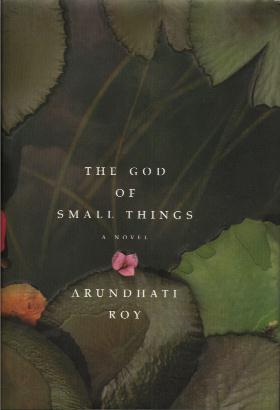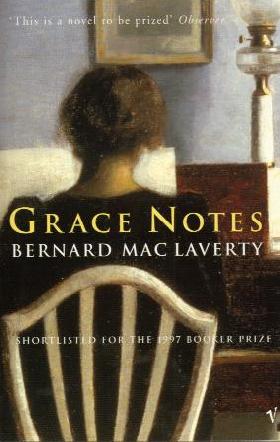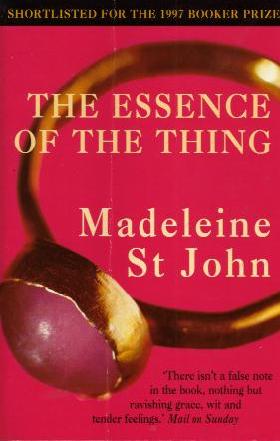
Arundhati Roy
The following novels constitute the shortlist for the 1997 Booker Prize:
Notable Omissions from the 1997 Shortlist

|
The God of Small Things Arundhati Roy |
Dustjacket synopsis:
"The year is 1969. In the state of Kerala, on the southernmost tip of India, a skyblue Plymouth
with chrome tailfins is stranded on the highway amid a Marxist workers' demonstration. Inside
the car sit two-egg twins Rahel and Esthappen, and so begins their tale...
"Armed only with the invincible innocence of children, they fashion a childhood for themselves in the shade of the wreck that is their family - their lonely, lovely mother, Ammu (who loves by night the man her children love by day), their blind grandmother, Mammachi (who plays Handel on her violin), their beloved uncle Chacko (Rhodes scholar, pickle baron, radical Marxist, bottom-pincher), their enemy, Baby Kochamma (ex-nun and incumbent grandaunt), and the ghost of an imperial entomologist's moth (with unusually dense dorsal tufts).
"When their English cousin, Sophie Mol, and her mother, Mararet Kochmamma, arrive on a Christmas visit, Esthappen and Rahel learn that Things Can Change in a Day. That lives can twist and into new, ugly shapes, even cease forever, beside their river "graygreen. With fish in it. With the sky and trees in it. And at night, the broken yellow moon in it."
"The brilliantly plotted story uncoils with an agonizing sense of foreboding and inevitability. Yet nothing prepares you for what lies at the heart of it.
"The God of Small Things takes on the Big Themes - Love. Madness. Hope. Infinite Joy. Here is a writer who dares to break the rules. To dislocate received rhythms and create the language she requires, a language that is at once classical and unprecedented. Arundhati Roy has given us a book that is anchored to anguish, but fueled by wit and magic."
First Paragraph:
May in Ayemenem is a hot, brooding month. The days are long and humid. The river shrinks and black crows gorge on bright mangoes in still, dustgreen trees. red bananas ripen. Jackfruits burst. Dissolute bluebottles hum vacuously in the fruity air. Then they stun themselves against clear windowpanes and die, flatly baffled in the sun.
The nights are clear, but suffused with sloth and sullen expectation.
But by early June the southwest monsoon breaks and there are three months of wind and water with short spells of sharp, glittering sunshine that thrilled children snatch to play with. The countryside turns an immodest green. Boundaries blur as tapioca fences take root and bloom. Brick walls turn mossgreen. Pepper vines snake up electric poles. Wild creepers burst through laterite banks and spill across the flooded roads. Boats ply in the bazaars. And small fish appear in the puddles that fill the PWD potholes on the highways.
Notes:
You can find web pages devoted to Arundhati Roy at:
The Arundhati Roy Web run by Jon Simmons
and at arundhatiroy.com.
From the Random House hardback edition, 1997.

|
Quarantine Jim Crace |
Dustjacket synopsis:
"Hell is other people...
"Two thousand years ago four travellers enter the Judean desert to fast and pray for their lost souls. In the blistering heat and barren rocks they encounter the evil merchant Musa - madman, sadist, rapist, even a Satan - who holds them in his tyrannical power. Yet there is another, a faint figure in the distance, fasting for forty days, a Galilean who they say has the power to work miracles...Here, trapped in the wilderness, their terrifying battle for survival begins..."
Quotes:
"Absolutely compelling...From its opening scene it compels you to turn pages by means of
qualities that are uniquely its own" - Observer
"A storyteller of unique gifts...One of the finest novels I've read in years " - The Times
"Stunning...A writer of hallucinatory skill and considerable cruelty" - John Updike, New Yorker
"Easy to read, completely captivating " - Amanda Craig, Literary Review
"Dazzling, gritty brilliance...this is a novel of scorching distinction " - Sunday Times
"Extraordinary imagination; he has built up a fiercely devoted cult following over the past few
years" - Nick Hornby
First Paragraph:
Miri's husband was shouting in his sleep, not words that she could recognize but simple, blurting fanfares of distress. When, at last, she lit a lamp to discover what was tormenting him, she saw his tongue was black - scorched and sooty. Miri smelled the devil's eggy dinner roasting on his breath; she heard the snapping of the devil's kindling in his cough. She put her hand on to his chest; it was soft, damp and hot, like fresh bread. Her husband, Musa, was being baked alive. Good news.
Miri was as dutiful as she could be. She sat cross-legged inside their tent with Musa's neck resting on the pillow of her swollen ankles, his head pushed up against the new distension of her stomach, and tried to lure the fever out with incense and songs. He received the treatment that she - five months pregnant, and in some discomfort - deserved for herself. She wiped her husband's forehead with a dampened cloth. She rubbed his eyelids and his lips with honey water. She kept the flies away. She sang her litanies all night. But the fever was deaf. Or, perhaps, its hearing was so sharp, that it eavesdropped on Miri's deepest prayers and knew that Musa's death would not be unbearable. His death would rescue her.
Notes:
This novel won the 1997 Whitbread Novel Award.
From the Viking paperback edition, 1997.
Originally published by Viking.

|
The Underground Man Mick Jackson |
Dustjacket synopsis:
"The 5th Duke of Portland is a Victorian misfit, a man who spends his time and wealth creating
a network of tunnels beneath his Nottinghamshire estate. As he withdraws further from society he falls
prey to his lonely self-absorption and to the mercy of his household staff. His rare appearances are
misinterpreted and local gossip has inflated his eccentricities into sinsiter deformities.
"No one, not even he, understands his most persistent ache, a pain of absence that no amount of tunnelling or searching can bring to life. The Duke's slow piecing together of the truth about his past builds to an intensely moving and powerful conclusion."
Quotes:
"Soaked through with originality and expertly written: tragi-comic fiction with the most endearingly
sympathetic of anti-heroes" - Dominic Bradbury, The Times
"A remarkable balancing act, witty, restrained and shot through with interesting tensions. As a first novel
it is, quite simply, astonishing" - Christina Patterson, Observer
"A strong narrative drive, a Gothic twist and a wonderful cast of secondary characters make this an
entrancingly readable book. What lifts it into the prize-deserving category is Jackson's uncannily visual
prose" - Miranda Seymour, Sunday Telegraph
First Paragraph:
I have no idea how an apple tree works. The quiet machine beneath the bark is quite beyond my ken. But, like the next man along, I find imagination always willing to leap into Ignorance's breach ...
The tree roots I imagine, play a major part - managing somehow to soak up the richness of the earth. I picture this richness drawn slowly up the trunk, pumped out along every branch.
No doubt the sun and rain are also involved, their warmth and moisture in some way being essential to the constitution of the tree. But how the richness of the earth, the sun and the rain come together to produce (i) a perfect blossom, then (ii) a small apple-bud - well, that remains a mystery to me.
From the Picador paperback edition, 1998.

|
Grace Notes Bernard Mac Laverty |
Quotes:
"This is a novel to be prized" - Observer
"Beautifully structured...this is a marvellous book" - Independent on Sunday
"Here, more powerfully than ever, Mac Laverty proves that...he ranks as a master of haunted
realism...His best novel yet. He deals with death and love and tragedy" - Tom Adair, Observer
"Mac Laverty's long-dormant powers as a novelist marvellously revive...Suffused with
luminous attentiveness as it surveys Catherine's attempts to keep her life and her art in
equilibrium, it's a magnificent portrait of the sources and ends, wretchedness and rewards
of creativity" - Peter Kemp, Sunday Times
"The strongest impression left by Grace Notes is that of its central image - of
the 'notes between notes' which seem to compose themselves: of a life happening while its heroine
is busy making other plans. If architecture is frozen music, Grace Notes is the
literary equivalent, full of its own powerful rhythm" - Tobias Hill, The Times
"This is writing of a high quality...Mac Laverty brings off the remarkable feat of allowing
the reader to hear music that has not been written... It is magical...A convincing work of
art" - Allan Massie, Scotsman
First Paragraph:
She went down the front steps and walked along the street to the main road. At this hour of the morning there was little or no traffic. If there was car, then it sounded just like that - a car going past in the wet - there was no other city noise. It was still dark and the street lights were reflected on the road surface. She tucked her hair back and put her collar up as far as it would go. The raincoat was creased as if it has just been unpacked. She made her way to the bus station on foot carrying a small hold-all.
She was early at the airport stance and walked up and down the concrete pavement. It was lined and felt, through the soles of her shoes, like hard sand close to the water's edge. It was a way of not thinking - to concentrate on her surroundings. Somewhere a man was whistling at least she assumed it was a man. Women rarely whistled.
From the Vintage paperback edition, 1998.
Originally published by Jonathan Cape.

|
Europa Tim Parks |
Quotes:
"For sheer enjoyment, try this trip taken by Jerry Marlow, the narrator and his fellow
pedagogues, plus their supporting, largely female, student body, from Milan to the
European Parliament in Strasbourg...Doffing his hat to Joyce and Beckett, Parks really hits his
stride " - Mail on Sunday
"The best thing about Europa is the voice Tim Parks conjures up: Marlow's wry,
defeated reason keeps you turning the pages...A forlorn but seductive voice, reminding us that
it is far easier to unite a sprawling continent than a few cubic metres that contain the
human soul" - Sunday Times
"The triumph of the work is its discomforting portrayal of an agile mind hampered by the twin
shackles of longing and disgust...Europa is that rare beast, a book which demands and
withstands a second reading" - Daily Telegraph
"Europa is a full rounded and very disturbing novel guaranteed to intrigue and more
often than not, have you squirming and wincing" - The Times
First Paragraph:
I am sitting slightly off-centre on the long back seat of a modern coach crossing Europe. And this in itself is extraordinary. I hate coaches, I have always hated coaches, and above all I hate modern coaches, not just because of the strong and nauseating smell of plastics and synthetic upholstery, but because of the way the supposed desires of the majority are now foisted upon everybody - I mean myself - in the form of the videoscreens projecting from beneath the luggage rack every six seats or so, and of course piped music oozing from concealed loudspeakers. So that even as we pull out of Piazza dell'Universita into the morning traffic on Corso Vercelli in this strange city I have lived in for so long of stone and trams and noble facades and Moroccans selling boxes of contraband cigarettes laid out on pavements under propped-up umbrellas - because it's raining, as it will in Milan in May - even now, before the long trip has hardly started, we are having to listen to a smug male voice singing with fake and complacent hoarseness about un amore passionale, which he cannot, he claims, forget, and which has destroyed his life forever, a theme, I suspect that may be the very last thing one needs to be subjected to at only shortly after eight on a Monday morning, and not long after one's forty-fifth birthday. Though many of the younger travellers are singing along (the way fresh recruits, I believe, will sing along on their way to war).
From the Vintage paperback edition, 1998.
Originally published by Seeker & Warburg.

|
The Essence of the Thing Madeleine St John |
Quotes:
"There isn't a false note in the book, nothing but ravishing grace, wit and tender feelings." - Mail on Sunday
"Nicola pops out of the smartly done-up flat in London's Notting Hill Gate for a packet of cigarettes.
When she returns, her lover, Jonathan, calmly informs her that their cohabitaton is at an end. Why?
Nicola has no idea. . . Gradually she begins to fight back, and one of the many pleasures of the novel
is witnessing the buckling on of her armour. Not much in the way of folly escapes Madeleine St John,
and the oubliette she opens into the darker reaches of the spirit is unsettling." - Elizabeth Buchan,
The Times
"St John has perfect pitch. Her conversational style and short chapters paint an entirely accurate
picture of urban, middle-class pretensions." - Independent
"The touch is light, the dialogue crisp and funny, and the strength to be gained from friendships
shines like a beacon." - Sunday Times
"I thought it was an astonishing book to read. Her ear is so perfect. . . She has got it precisely
right. Very clever. A tour de force." - Susan Jeffries, Kaleidoscope
First Paragraph:
Nicola was still standing in the doorway when Jonathon began to speak: she hadn't had time even to take off her coat. It was a cold spring evening: one still needed a coat out of doors after dark.
She was standing there in the sitting-room doorway, her hands in her pockets, holding on to the packet of cigarettes she had gone out to buy, and the loose change, and the keys; she hadn't had time even to put these things on the table, and take off her coast , and sit down, because Jonathon had called out to her as soon as she'd shut the front door behind her. 'Nicola?' But in a tone of voice which seemed odd to her: too sharp, too urgent: and she'd stood, perplexed, in the doorway, her fingers having suddenly tightened around the cigarettes, the keys, the loose coins: 'What is it?' she said. Is something wrong?
From the Fourth Estate paperback edition, 1997.
Notable Omissions from the Shortlist:
"Jack Maggs", Peter Carey (winner of the 1998 Commonwealth Writers Prize, winner of the 1998 Miles Franklin Award, shortlisted for the 1997 Guardian Fiction Prize)
"Love and Longing in Bombay", Vikram Chandra (shortlisted for the 1997 Guardian Fiction Prize)
"Easy Peasy", Lesley Glaister (shortlisted for the 1997 Guardian Fiction Prize)
"Salt", Earl Lovelace (winner of the 1997 Commonwealth Writers Prize)
"Enduring Love", Ian McEwan (shortlisted for the 1997 Guardian Fiction Prize)
"The Ventriloquist's Tale", Pauline Melville (winner of the 1997 Whitbread First Novel Award, shortlisted for the 1998 Orange prize)
"Fugitive Pieces", Anne Michaels (winner of the 1997 Guardian Fiction Prize)
"Ingenious Pain", Andrew Miller
"Larry's Party", Carol Shield (winner of the 1998 Orange Prize, shortlisted for the 1997 Guardian Fiction Prize)
This page and its contents are copyright © 2002 by Perry Middlemiss, Melbourne, Victoria, Australia.
Last modified: April 2, 2002.